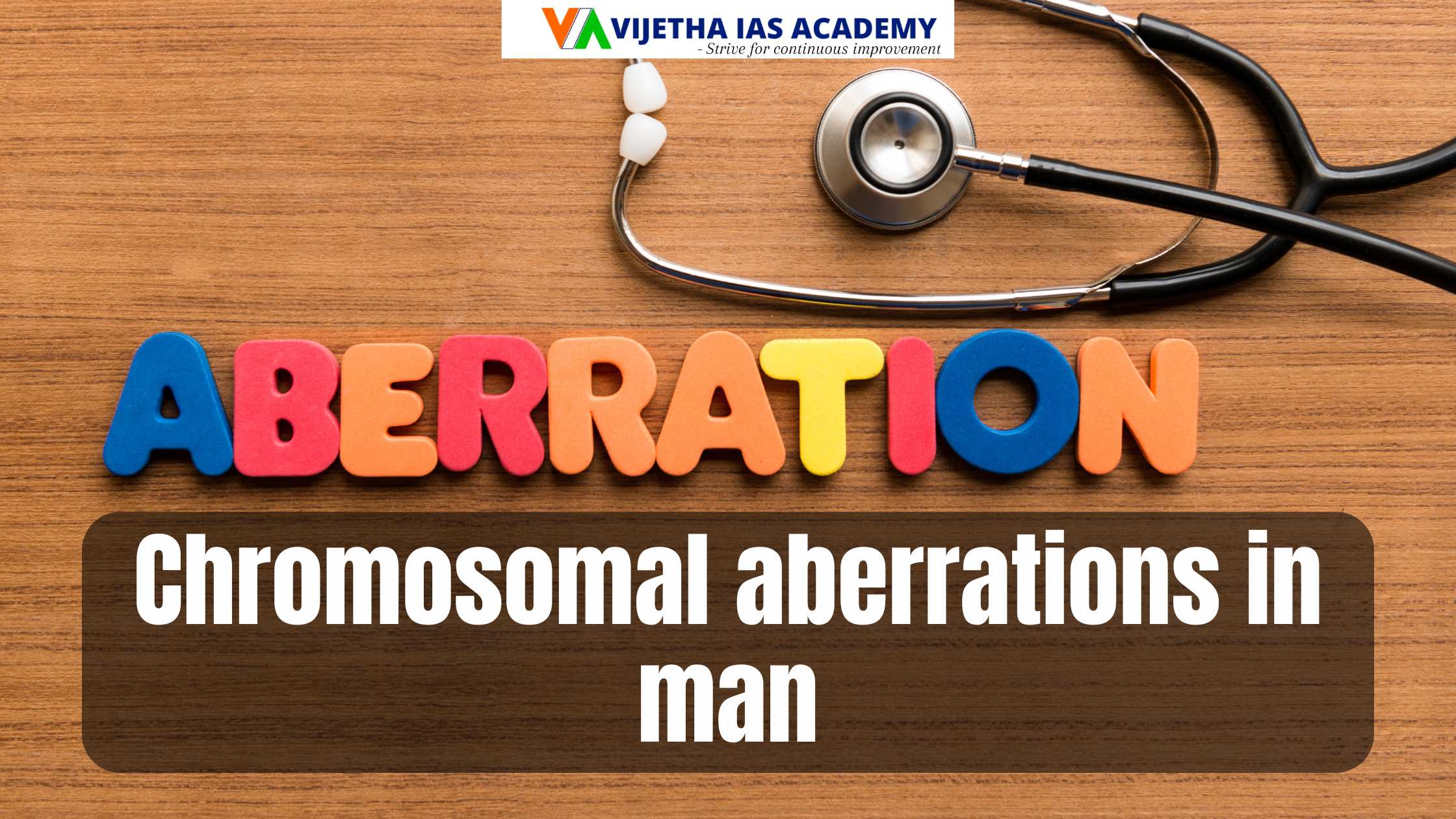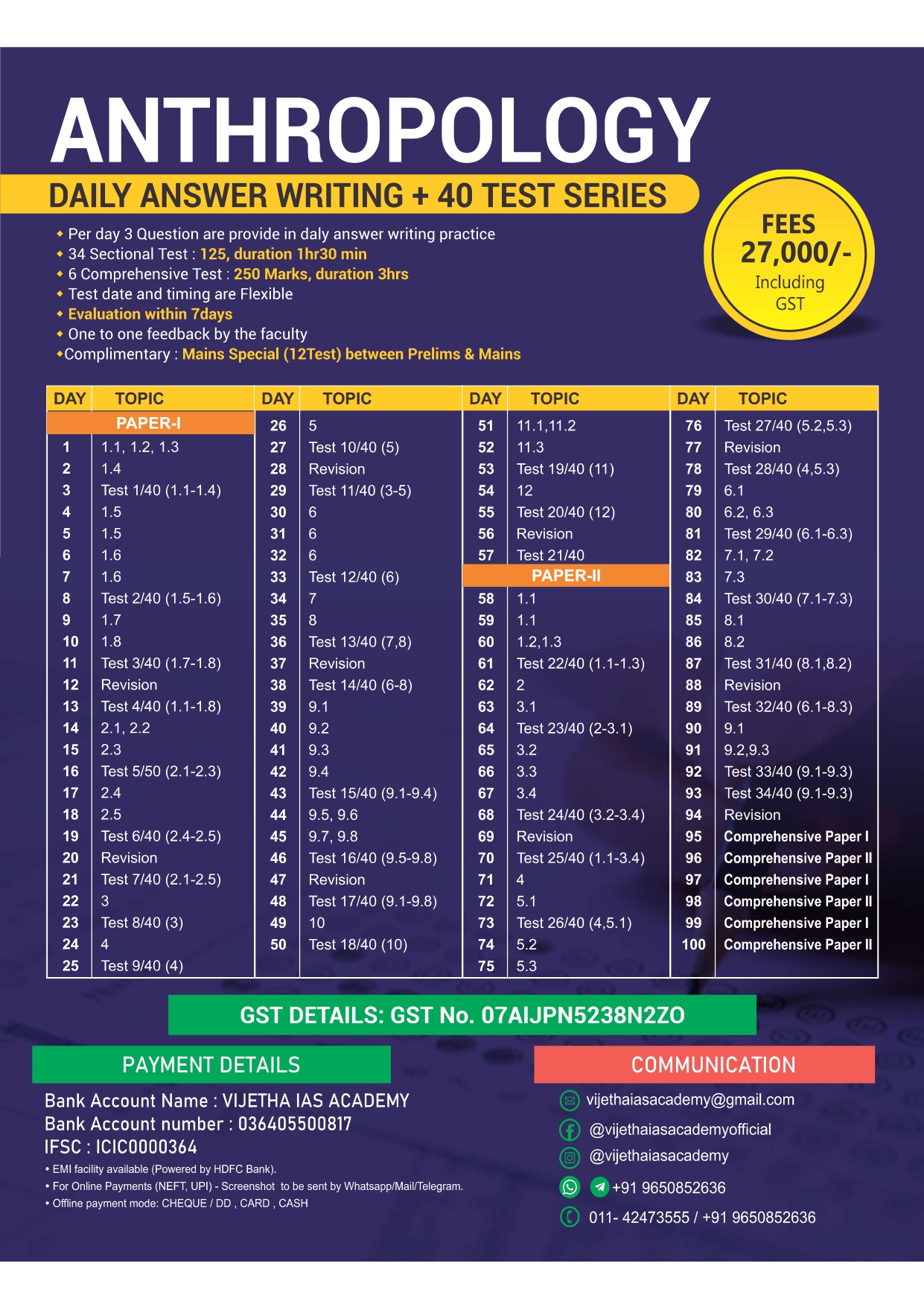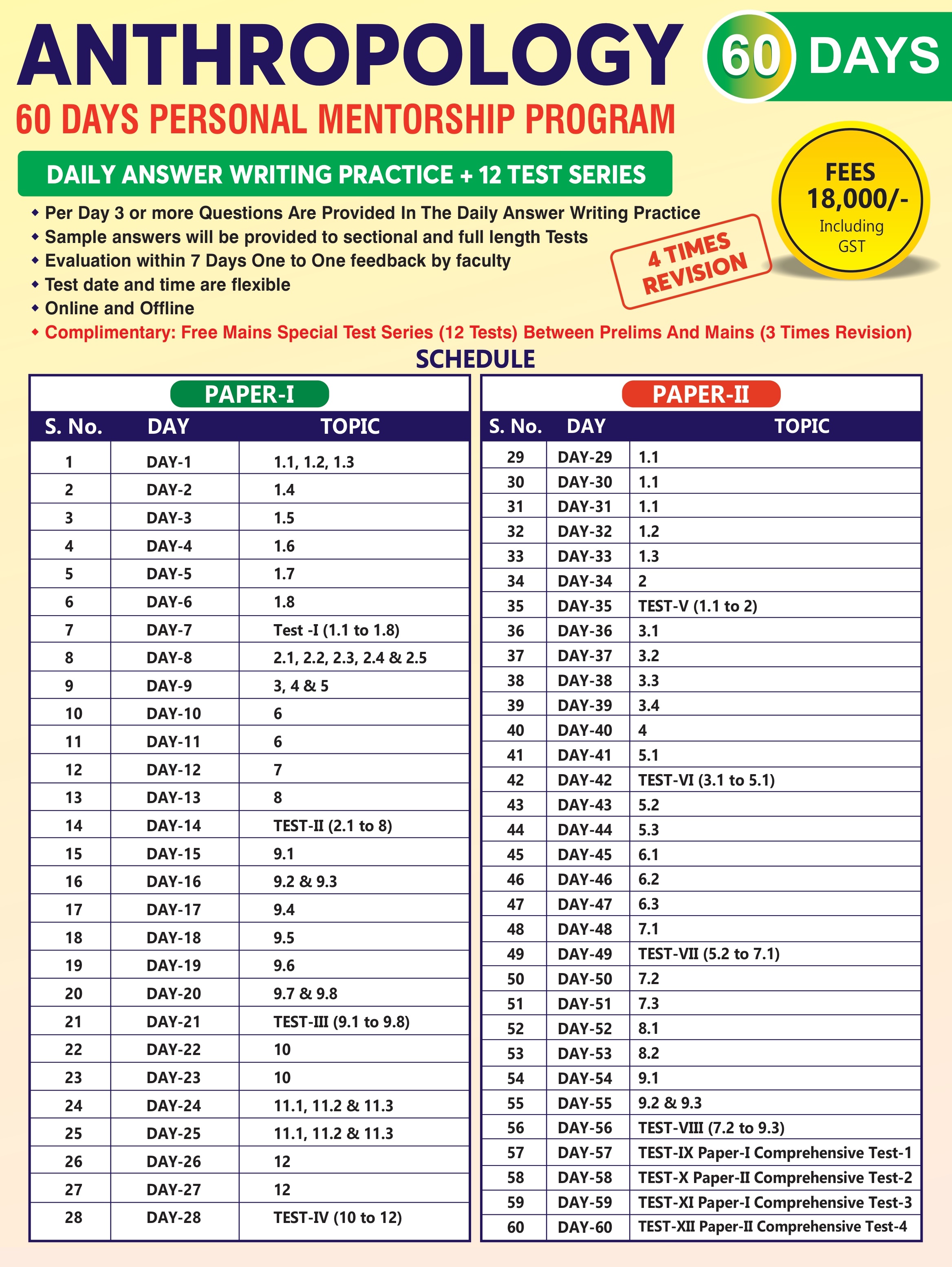
What is meant by karyotype? How does its analysis help in diagnosis of the chromosomal aberrations in man?
(20 Marks) Anthropology Optional Paper CSE 2024
Introduction
A karyotype is the complete set of chromosomes in an individual, organized systematically based on their number, size, shape, and banding patterns. This analysis is crucial for identifying chromosomal abnormalities. In humans, a normal karyotype consists of 46 chromosomes, arranged in 23 pairs, including one pair of sex chromosomes (XX or XY). Karyotype analysis helps detect deviations in the number or structure of chromosomes, providing key insights into genetic disorders and chromosomal aberrations.
Main Body
Karyotype Definition and Structure:
A karyotype displays the chromosomes during the metaphase stage of cell division, when they are most condensed and visible. Chromosomes are stained, often using Giemsa dye, which highlights distinct banding patterns for easier identification.
Chromosomes are classified based on their size, centromere position, and banding patterns, and arranged in pairs from largest to smallest. The sex chromosomes are identified separately.
Chromosomal Aberrations: Chromosomal aberrations can be numerical or structural:
Numerical Aberrations: These involve a change in the number of chromosomes, typically caused by nondisjunction during meiosis.
Aneuploidy: The presence of an abnormal number of chromosomes. For example, Down syndrome (Trisomy 21) occurs due to an extra copy of chromosome 21, while Turner syndrome (45, X) results from a missing X chromosome in females. Klinefelter syndrome (47, XXY) occurs due to an extra X chromosome in males.
Polyploidy: A condition where an organism has more than two complete sets of chromosomes, which is rare in humans but common in plants.
Structural Aberrations: These involve changes in the structure of chromosomes.
Deletions: A portion of a chromosome is missing. For example, Cri du chat syndrome results from a deletion on chromosome 5.
Duplications: A part of the chromosome is duplicated, leading to extra genetic material.
Inversions: A segment of a chromosome is reversed end to end.
Translocations: This occurs when a segment of one chromosome is transferred to another, such as in Robertsonian translocations between acrocentric chromosomes, which can lead to conditions like Down syndrome.
Ring Chromosomes: These form when a chromosome's ends fuse together after deletions, forming a ring structure.
Karyotype Analysis in Diagnosis:
Prenatal Diagnosis: Karyotyping is widely used in prenatal screenings, such as amniocentesis or chorionic villus sampling (CVS), to detect chromosomal abnormalities in the fetus. Conditions like Down syndrome, Edward syndrome (Trisomy 18), and Turner syndrome can be diagnosed early, allowing for informed reproductive decisions.
Diagnosis of Genetic Disorders: Many genetic disorders are linked to chromosomal abnormalities. For example, Turner syndrome, characterized by a missing X chromosome, and Klinefelter syndrome, caused by an extra X chromosome in males, are diagnosed through karyotype analysis.
Cancer Detection: Certain cancers, particularly leukemias and lymphomas, are associated with chromosomal abnormalities. For example, the Philadelphia chromosome (translocation between chromosomes 9 and 22) is linked to chronic myelogenous leukemia (CML).
Infertility and Miscarriages: Karyotype analysis helps in cases of infertility or recurrent miscarriages by identifying chromosomal translocations or structural abnormalities that could affect reproduction.
Procedure of Karyotype Analysis:
Sample Collection: Cells can be collected from blood, amniotic fluid, bone marrow, or other tissues. In prenatal diagnosis, fetal cells are obtained via amniocentesis or CVS.
Chromosome Preparation: The collected cells are cultured to promote cell division, and then treated with chemicals to arrest them in metaphase, the stage when chromosomes are most visible.
Staining and Imaging: Chromosomes are stained (usually using Giemsa for G-banding), photographed, and arranged according to size and shape for analysis.
Interpretation: A trained cytogeneticist analyzes the karyotype for any abnormalities in number or structure.
Limitations and Advancements: While karyotype analysis is highly effective for detecting large-scale chromosomal abnormalities, it has limitations in identifying small genetic mutations. Advanced techniques like fluorescence in situ hybridization (FISH) and comparative genomic hybridization (CGH) complement karyotyping by detecting smaller genetic changes or gene-level mutations.
Conclusion
Karyotype analysis is a vital tool in understanding and diagnosing chromosomal aberrations. It allows for early detection of genetic disorders, plays a key role in prenatal screening, and helps in understanding the genetic basis of diseases like cancer and infertility. While traditional karyotyping has limitations in detecting small-scale mutations, it remains a foundational diagnostic method in medical genetics and has significantly contributed to advances in human health and disease management.
Anthropology Test Series Programme (Online + Offline))
We provide Anthropology Daily Answer Writing a range of programs designed to cater to various stages of UPSC preparation. Whether you're just starting out, have attempted the Mains before, or are getting ready for Mains 2024, we have the right option for you. Allow us to assist you in choosing the course that best fits your needs.
|
Level of Preparation |
Test Series Program |
Test Series Content |
Test Schedule |
|
Self-study of Anthropology Optional |
Anthropology 100 Days Personal Mentorship Program |
Daily answer writing, 34 sectional tests, 6 comprehensive tests, and complementary Mains Special 12 tests (between prelims and mains) |
|
|
Revise whole syllabus through Daily Answer Writing Practice and Tests |
Anthropology DAW Mentorship Program |
Daily Answer Writing Practice and 8 sectional and 4 Full Length tests |
|
|
Revise whole syllabus through Sectional and Full Length Tests |
Anthropology Tier- I T-40 Test Series |
34 Sectionals and 6 Full Length Tests |
|
|
Written Mains earlier and need more practice |
16-Anthropology Tier II Test Series |
10 sectional and 6 Full-Length Tests. |
|
|
Cleared Prelims 2023 and are preparing for Mains 2023 |
Mains Special 12 Tests program |
8 Sectional and 4 Full-Length Tests |
ANTHROPOLOGY MAINS SPECIAL COURSES
Enroll in our Anthropology Mentorship Program today and take the first step towards achieving your UPSC goals!
1) If you are going for Self study of Anthropology Optional and looking for a Comprehensive Program that includes Daily Answer Writing, 34 Sectional tests, 6 Comprehensive tests, and Complementary mains special 12 tests (between prelims and mains), our Anthropology 100 Days Personal Mentorship Program is the perfect choice.
2) If you want to revise Whole Syllabus through Daily Answer Writing Practice and 8 sectional and 4 full length tests, then our Anthropology DAW Mentorship Program is the best fit for you.
3) If you want to revise Whole Syllabus through 34 Sectionals and 6 Full Length Tests then Anthropology Tier- I T-40 Test Series is for you.
4) If you have written Mains earlier and need more practice, then our 16-Anthropology Tier II Test Series is a great option. This test series includes 10 sectional and 6 full-length tests.
5) if you have cleared Prelims 2023 and are preparing for Mains 2023,our Mains Special 12 Tests program is a must-have. This program includes 8 sectional and 4 full-length tests to help you prepare for the big day.
For more information on Vijetha IAS Academy’s Anthropology mentorship programs Deatils : https://vijethaiasacademy.com/anthropology-test-series
Anthropology 100 Days Personal Mentorship Program ( 7 + 3 Times Revision )

Anthropology 60 Days Personal Mentorship Program ( 4 + 3 Times Revision )

For more information: https://vijethaiasacademy.com/anthropology-test-series
Details Of Anthropology Classes Program
Top Anthropology Optional IAS Coaching Center in Delhi Vijetha IAS Academy | Best Anthropology Optional IAS Coaching in Delhi
Fee Structure:
- Tier 1: Rs. 55,150/- (3 Years Validity of Offline/Live Batch)
- Tier 2: Rs. 42,000/-
- Tier 3: Rs. 36,000/-
Batch Size: 50 – 60 Students
UPSC Notes
Anthropology Optional IAS Coaching Notes, IAS Exam Preparation Booklets, IAS optional coaching Notes, UPSC Coaching Notes, Video Lectures, Live Classes with faculty, Chat Facility Available
Teachers Name: N P Kishore Sir
Past Result
- Last Years Result 2023
- 35 Total Selections in CSE 2023
Google Reviews: 4.9 out of 5 stars
Website: Vijetha Anthropology Optional IAS Coaching in Delhi (https://vijethaiasacademy.com)
Faculties of Vijetha IAS Academy
- N P Kishore Sir
Features
- Vijetha IAS Academy offers Online and offline Courses for better preparation of Anthropology Optional Strategy for UPSC in Delhi.
- For better Anthropology optional Exam Preparation, Vijetha IAS Academy Delhi Conducts the Motivational IAS Session.
- Vijetha IAS Academy provides you with the CASE STUDIES on the pattern of the real-time IAS Exam which is helpful for better preparation of the Best Coaching for UPSC Anthropology Optional Optional IAS Examination.
- DAW & WAW – Revision Through Daily & Weekly Answer Writing Practice is offered by Vijetha IAS Academy for better result of the Anthropology Optional IAS examination.
Advantages of joining Vijetha IAS Academy
- Best Faculties for Anthropology Optional IAS Coaching in Delhi
- Best facilities, infrastructure and updated Case Studies Booklets and Notes for better preparation of the Anthropology Optional IAS Examination in Delhi.
- Best result in Past years for Anthropology Optional Strategy for UPSC Examination in Delhi
- Best Rated coaching institute for Anthropology Optional IAS Examination in Delhi.
- Vijetha IAS Academy also provides recorded lectures videos, notes which is very helpful for better preparation of Anthropology Optional IAS Coaching in Delhi
Fees Structure of Vijetha IAS Academy
|
Tier 2 |
Tier 1 |
Tier 3 |
BATCH STARTS FROM |
|
42,000/- |
55,150/- (3 Years Validity Offline/Live Batch) |
36,000/- |
REGISTRATION – START |
Fees Structure of Vijetha IAS Academy
|
Course Name |
Fees Amount |
Course Duration |
|
GS Offline (Pre + Mains+ CSAT) with Essay+Answer Writing |
Rs.99,000 (Including GST) |
400+ Days |
|
GS Online |
Rs.18,999 (Including GST) |
400+ Days |
|
GS Mentorship Programme |
Rs.29,999 (Including GST) |
1 Year |
For more information on our courses, visit our Anthropology Courses page. Explore our Test Series and Online Courses for flexible learning options.
Vijetha IAS Academy
Add. 2nd Floor, 50, Shankar Road, Block 7, Old Rajinder Nagar, Rajinder Nagar, New Delhi, Delhi 110060
MOB. 096508 52636
Open 7 Am : Closes 9 PM
Keywords: Understanding Karyotype , anthropology 2024 question paper, Anthropology optional subject question paper 2024, Anthropology optionals 2024 question paper, Anthropology Optional Coaching UPSC, Vijetha IAS Academy Anthropology, Anthropology crash course UPSC, Anthropology daily answer writing UPSC, Kishore sir Anthropology, karyotype, chromosomal aberrations, genetic disorders.
